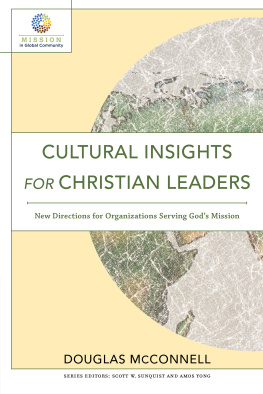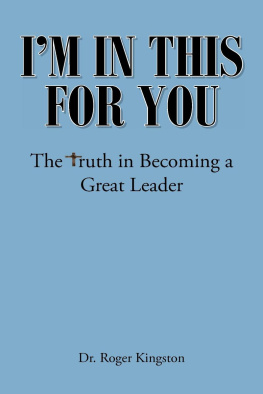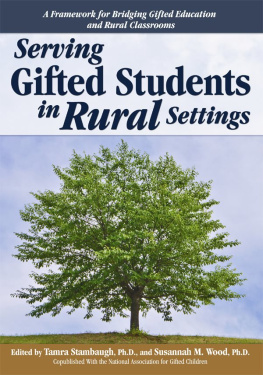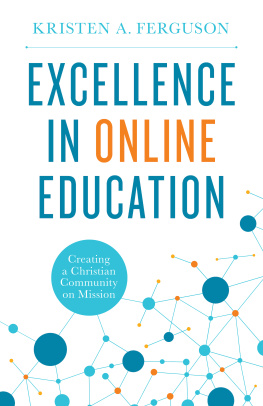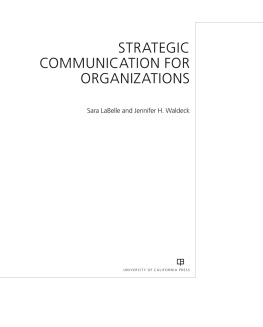1. Thinking Missiologically: Implications for Leadership and Organizations
2. Culture and Human Nature: The Complex Unity of Human Organizations
3. Caring about Members and Others as People: Notions of Self and Others
4. Learning Culture Naturally: Imitation and Rituals
5. Authority and Culture: Whom Do You Trust?
6. Intercultural Realities: Four Worlds of Christian Organizations
7. Leading in Context: Cultural Influence and Intercultural Leadership
8. Responding Missionally: Learning into Practice
Series Preface
A mission leader in 1965, not too long ago, could not have foreseen what mission looks like today. In 1965 nations in the non-Western world were gaining their independence after centuries of Western colonialism. Mission societies from Europe and North America were trying to adjust to the new global realities where Muslim nations, once dominated by the West, no longer granted missionary visas. The largest mission field, China, was closed. Decolonization, it seemed, was bringing a decline to missionary work in Africa and Asia.
On the home front, Western churches were in decline, and the traditional missionary factoriesmainline churches in the Westwere struggling with their own identities. Membership was thenand remainsin decline, and missionary vocations were following the same pattern. Evangelical and Pentecostal churches began to surpass mainline churches in mission, and then, just when we thought we understood the new missionary patterns, Brazilians began to go to Pakistan and Malaysians began to evangelize Vietnam and Cambodia. Africans (highly educated and strongly Christian) began to move in great numbers to Europe and North America. Countries that had been closed began to see conversions to Christ, without the aid of traditional mission societies. And in the midst of this rapid transformation of missionary work, the alarm rang out that most Christians in the world were now in Asia, Latin America, and Africa rather than in the West.
What does it mean to be involved in mission in this new world where Christianity has been turned upside down in less than a century?
This series is directed at this new global context for mission . Fuller Theological Seminary, particularly through its School of Intercultural Studies (formerly School of World Mission), has been attentive to trends in global mission for over half a century. In fact, much innovation in mission thinking and practice has emanated from Fuller since Donald McGavran moved from Oregon to Californiaas the first and founding dean of the then School of World Missionto apply lessons about church growth learned in India to other areas of the world. Since that time many creative mission professors have provided global leadership in mission thinking: Ralph Winter (unreached people groups), Paul Hiebert (anthropology for mission), Charles Kraft (mission and spiritual dynamics), and Dudley Woodberry (Islamics), among others.
This series provides the most recent global scholarship on key themes in mission, written for a general audience of Christians committed to Gods mission. Designed to be student, user, and textbook friendly, each volume contains voices from around the world speaking about the theme, and each chapter concludes with discussion questions so the books can be used for group studies. As the fields of mission are changing, shifting, or shrinking, the discussions connect the church and the world, East and West, North and South, the developed and developing worlds, each crossing cultural, political, social, and religious boundaries in its own way and knitting together people living and serving in various communities, both of faith and of other commitmentsthis is the contemporary landscape of the mission of God. Enjoy the challenges of each volume and find ways to live into Gods mission.
Scott W. Sunquist
Amos Yong
Series Page

S COTT W. S UNQUIST
AND A MOS Y ONG ,
SERIES EDITORS
The Mission in Global Community series is designed to reach college students and those interested in learning more about responsible mission involvement. Written by faculty and graduates from Fuller Theological Seminary, the series is designed as a global conversation with stories and perspectives from around the world.
Introduction
Leading a Christian organization is a sacred duty. If you accept the position, you must shoulder the responsibility, and that includes being a learner. Learning will never cease to be important in that role. One seasoned veteran charged that as leaders we should make new mistakes! I like that approach for a couple of reasons. First, it recognizes our humanity and, therefore, the inevitability of mistakes. The world is moving quickly, and we are trying our best, but that doesnt mean we lead perfectly. Second, we find hope in learning from our mistakes. Although we will make mistakes, we can and must set a course to learn from them and to do it better next time. Does that mean we should feel free to make mistakes? Not necessarily; instead, we should feel free to learn from others and approach the challenges as a community, not a loner. Learning to lead means learning from others, their mistakes and successes. It also means that fear of failure and the overwhelming pace of change should not paralyze us. We lead in humility, as Christians serving the mission of God, and also in faith that God is trustworthy and gracious.
Leaders today face a tremendous challenge in the increasing influence of the cultures that surround our organizations. We cannot simply learn the ways of a particular culture and then move ahead with confidence. Many cultures are at play, not the least of which is the organizational culture of which we are a part. We must become students of culture so as to lead wisely in an era of globalization. Learning is such a privilege; it is too important to squander. The purpose of this book is to explore what we are learning about culture and the implications for Christian leaders of organizations serving Gods mission. In gathering my thoughts for this book, I decided to organize it around a central question: What are we learning about culture that will help shape, catalyze, and propel our organizations missionally?

